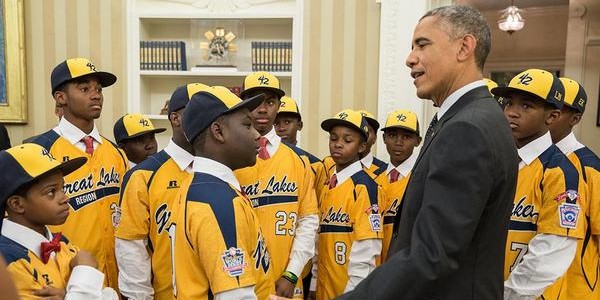 We all wanted to believe in the Little League team called Jackie Robinson West. We wanted to believe they were one of those uplifting underdog stories that have come to define us as Americans. That’s the image we were sold all summer long during the televised Little League World Series as viewership soared.
We all wanted to believe in the Little League team called Jackie Robinson West. We wanted to believe they were one of those uplifting underdog stories that have come to define us as Americans. That’s the image we were sold all summer long during the televised Little League World Series as viewership soared.
We invested our time and our emotions in that team and we celebrated along with them even after they lost in the finals to the South Korea. They help to unite Chicago and gave that city something to cheer about. They gave us all something to cheer about. Then the dream all came to an abrupt end when we learned that the adults in charge of the team had cheated.
The Jackie Robinsons West adults had created a travel team or a super team within a Little League community program by taking players from outside its official boundaries for its All-Star team. Usually, travel teams eat away at community programs like Little League from the outside by luring players away from community programs. This is happening all over the country and it’s crushing community baseball programs like Little League. This is what happens in my novel, Saving Babe Ruth. As one of many readers have said on Amazon, “If you’ve ever been involved in youth baseball as a player or parent, then Saving Babe Ruth is a book you won’t want to miss.” Click here to learn more about Saving Babe Ruth.
But the adults involved in Jackie Robinson West were ingenious in a way. They planted the travel team seed on the inside of Little League and were able to take advantage of its benefits. Unlike pure travel teams that pay out of pocket for all of their tournaments, Little League subsidizes its winning All-Star teams. For example, Little League International picks up the costs for travel, food and lodging for the players and coaches of the 16 teams that make it to the World Series Tournament. Pure travel teams would love for someone to pick up their tournament expenses.
And no other tournament gets players the exposure of the Little League World Series. The television ratings were off the charts last summer. Exposure is the number one benefit for kids whose parents are searching for a college scholarship or dreaming of their child being drafted by a Major League Baseball team. Nobody can ever take away the exposure that these players gained over the summer.
Some are pointing the finger at Chris Janes for causing this mess. He’s the guy from Evergreen Park Little League who initially reported the violation. Why did he have to destroy a good story with the facts? It’s no wonder this guy is getting hate calls and death threats. It’s no wonder the police are keeping an eye on his house. He’s the real villain. Of course, I’m being sarcastic here, though some in the media have questioned his motives. I’ve listened to him and I don’t, but his motives don’t make any difference anyway because Little League International relies on volunteers like Chris Janes to make sure the entire baseball experience is fair. It’s a non-profit organization of checks and balances based on a large group of dedicated volunteers. If you want to question the motives of Chris Janes, why not question the motives of all the Little League volunteers as well?
In its statement, Little League International mentioned that it’s supported by volunteers. Little League mentioned it several times. Now if Little League International is going to rely on volunteers like Mr. Janes to police its tournaments, maybe it should step up and offer him some kind of support in his hour of need. I read the statement from Little League International disqualifying Jackie Robinson West and Chris Janes’ wasn’t mentioned. Perhaps they are trying to protect him, but I’d like to hear some support for Chris Janes from Little League International at some point. If they don’t, what volunteer is his right mind will object to any roster in the future? If Little League doesn’t openly support Chris Janes, then the entire volunteer model it’s advancing becomes a fallen house of cards.
Let’s look at this volunteer model from a different perspective. After Little League International doubled its television contract revenue in 2013 to an eight year, $76 million dollar package, they also upped their obligation to put on a legitimate World Series Tournament. Don’t get me wrong, I’m not on board with increasing television coverage of youth sports. But if they are going to do it, then at some point in the tournament process, every participating team must be scrutinized totally by professionals before the next level of tournament play begins. We may never know if there were other “illegal” teams participating in the 2014 Little League World Series Tournament.
In disqualifying Jackie Robinson West, Little League International made the right move, though they certainly did drag their feet. They did not do a thorough investigation at the outset of the complaint and initially they dismissed it. Let’s face it. They didn’t really want to find anything wrong with this team either. They benefited from its story and so it was hard for them to accept that anything could be wrong. But I’m for giving give credit where credit is due. In the end they did the right thing, the only thing they could do—they disqualified the Jackie Robinson West team.
In the emotional outburst of the moment, people voicing their opinions on social media wanted the responsible adults punished, but they wanted team of kids forgiven. That would send the wrong message and it would ignore some other kids in the process.
Somebody must have forgotten about the kids who didn’t make the Jackie Robinson West All-Star team but did properly live within its boundaries. Were their roster spots taken by outsiders? Did those kids lose an opportunity to play baseball?
Then there were the kids who played by their boundary rules against the Jackie Robinson West team throughout the various qualifying tournaments and lost. They all must be thinking how unfair it is to lose to a team that did not follow the rules. What lesson would we be teaching them if the Jackie Robinson West team was not disqualified?
In the final analysis, if we send the message that adults can cheat and it won’t impact the team, then there will be little in the way of a deterrent against adults cheating in the future. Is that a good idea in this day and age? I don’t think so.
In life, you deal with the cards that you’re dealt. There’s no need to protect kids from learning a valuable life lesson from this tragedy. I’m not just talking about the Jackie Robinson West kids either. (They’ll always have their memories and the adults will always be remembered as the ones responsible). I’m talking about all kids across America who play youth sports.
Yes, there are kids all over America talking with their parents and coaches about the lessons learned, both good and bad, from the Jackie Robinson West team experience. But it’s all good in the end. This quote is from Saving Babe Ruth:
Baseball, in David’s mind, was simply about teens making friends and playing together. It was about teamwork and cultivating relationships. It was about boys—and sometimes girls—having the time of their lives playing in their community, in their hometown, playing outside and not on some game console. Playing baseball wasn’t about travel ball, college scholarships, or the pros. Baseball, at its heart, was about casting some footings in the crazy lives of teenagers. It was about instilling a way to carry oneself in times of adversity and in times of success; it was about building a foundation that would last a lifetime.
Teaching life lessons is supposed to be what youth sports is all about. That’s how we help to mold the adults of tomorrow.
 Tom Swyers is an award winning youth sports advocate and is the author of Saving Babe Ruth.
Tom Swyers is an award winning youth sports advocate and is the author of Saving Babe Ruth.
When washed-out lawyer and Civil War buff David Thompson takes charge of the kids’ baseball league in town, he must call on all of his legal and survival skills to endure a wild, humor-laced thrill ride through an underworld filled with secrets and double lives that threaten his team, his league, his marriage, his family, and his life. Rated 4.7 out of 5 stars by Amazon readers. Learn more by clicking this link. Saving Babe Ruth is available in paperback at Amazon and in e-book format at most retail outlets.

